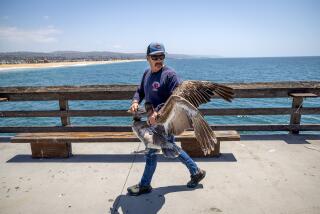First rehabilitated pelicans returned into wild after Santa Barbara oil spill

“They are home again,” veterinarian Christine Fiorello said.
- Share via
Reporting from Santa Barbara County — The rehabilitated brown pelicans waddled out of their cages and into the surf at Goleta Beach on Friday, slowly stretching their wings after a three-hour car ride from a Los Angeles care center.
A large crowd of scientists, reporters and beachgoers gathered to watch the 10 pelicans return to the wild, the first rescued animals to be released after thousands of gallons of oil spilled along the Santa Barbara County coast last month.
The pelicans began flapping their wings and took flight over the ocean.
“They are home again,” veterinarian Christine Fiorello said.
The birds were among hundreds of animals whose coats, skin, beaks and appendages were damaged by thick crude after a pipe owned by Plains All American Pipeline ruptured May 19, spilling more than than 100,000 gallons of oil into the ocean and along the coastline.
In the coming weeks, the remainder of the more than 100 live birds and mammals rescued from the spill will be returned to the wild.
Another 260 dead birds and mammals were found in the spill area.
In all, 10 adult pelicans were released after a team of scientists from UC Davis’ Oiled Wildlife Care Network spent three weeks cleaning and nursing them back to health in Los Angeles.
Five of the released pelicans were outfitted with small solar-powered satellite trackers. The birds could fly to the Channel Islands or as far away as Baja Mexico, said Michael Ziccardi, the director of the care network.
Ziccardi, who has responded to more than 50 oil spills, said releasing healthy animals “feels remarkable, every time.”
The 10 birds flew about 100 yards off the beach and gathered in a bunch on the water.
The crowd, full of young children and families celebrating with new graduates from UC Santa Barbara, cheered.
Follow @jpanzar
More to Read
Sign up for Essential California
The most important California stories and recommendations in your inbox every morning.
You may occasionally receive promotional content from the Los Angeles Times.











